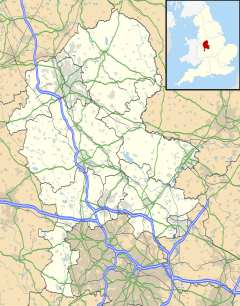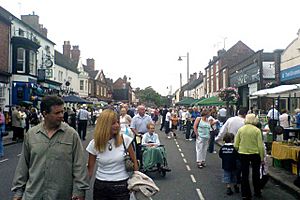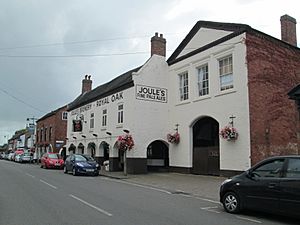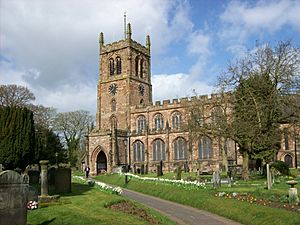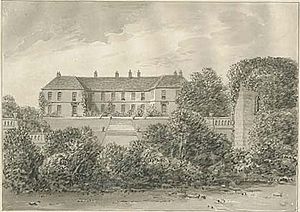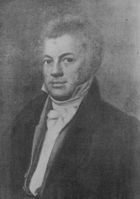Eccleshall facts for kids
Quick facts for kids Eccleshall |
|
|---|---|
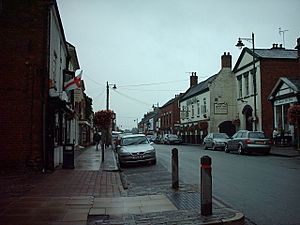 Eccleshall |
|
| Population | 6,500 (2022) |
| OS grid reference | SJ832291 |
| District |
|
| Shire county | |
| Region | |
| Country | England |
| Sovereign state | United Kingdom |
| Post town | STAFFORD |
| Postcode district | ST21 |
| Dialling code | 01785 |
| Police | Staffordshire |
| Fire | Staffordshire |
| Ambulance | West Midlands |
| EU Parliament | West Midlands |
| UK Parliament |
|
Eccleshall (/ɛkəlʃəl/) is a town and civil parish in the Stafford district. It is located in the county of Staffordshire, England. The town is about seven miles northwest of Stafford. It is also six miles west-southwest of Stone. Eccleshall is twinned with Sancerre in France.
Contents
History of Eccleshall
Early Beginnings of Eccleshall
The Domesday Book from 1086 tells us that Eccleshall was a small village. It had about one hundred people living there. Some old stone pieces at the base of the Parish Church of Holy Trinity show a stone church existed then. A 10th-century cross base still stands outside the church today. The oldest part of the church, its pillars and arches, were built around 1180. The rest of the church was finished in the 1200s. A beautiful upper window section was added in the 1400s.
Eccleshall Becomes a Market Town
Eccleshall grew into an important market town for the area. In 1153, it was given the right to hold a weekly market. Around the early 1200s, the village became a town. It was granted 'Borough' status. By 1259, it could hold a yearly fair during Ascensiontide. A survey in 1298 showed about five hundred people lived in the town. Most of them were craftsmen or worked in farming.
The Bishops and Eccleshall Castle
Eccleshall was a good location for the Bishop of Lichfield. It was on the main road between important church centers. These centers included Chester, Lichfield, and Coventry. Land was supposedly given to St Chad a long time ago. In 1200, Bishop Geoffrey de Muschamp got permission from King John to build a castle. From then until the 1860s, the castle was home to the Bishops of Lichfield.
The castle ruins you see today were built in 1305. Bishop William Langton, a friend of King Edward I, built it. He was also a Chancellor of England. This was a time when many castles were built. He created a strong fortress with four corner towers and a wide moat. Eccleshall Castle played a small part in the War of the Roses. It was a base for Lancastrian Queen Margaret of Anjou. She used it before and after her defeat at the Battle of Blore Heath in 1459.
Glass Making and the English Civil War
Bishop William Overton (1580–1609) brought two glass-making families to Eccleshall. They came from Lorraine in 1580. These families, Tyzack and Henzey, started making glass in Bishop's Wood. Glass making stopped around 1615. However, the site of one glass furnace has been dug up recently. You can still see it in Bishop's Wood.
In June 1643, the castle was attacked during the English Civil War. Sir William Brereton and his Parliament forces surrounded the church. Their cannons caused much damage to the castle walls. But the castle defenders held out. When the Parliament forces finally took the castle on August 30, they found the bishop had died. Most of the defenders had left for town. The castle was damaged. But enough of it remained to be used as a prison for Royalist nobles.
Coaching and Industry Changes
In the 1700s, roads improved with "turnpike trusts." These were groups that collected tolls to pay for road building. Coach travel became faster and more reliable. Eccleshall was on the main road from London to Chester. This made it an important stop for coaches. The town became busy, especially its inns. The large stables at the Royal Oak Hotel were a reminder of this time.
For three hundred years, leather working and shoemaking were important local jobs in Eccleshall. But by the late 1800s, these jobs almost disappeared. This was because of the growth of machine-made shoe factories in nearby Stafford.
The film I Know Where I'm Going! (1945) mentions Eccleshall. In the movie, Joan Webster (Wendy Hiller) meets her father in London. He tells her he traveled all the way from Eccleshall to see her.
Community Life in Eccleshall
Eccleshall's high street has many shops, pubs, restaurants, and businesses. A farmers' market is held every month. The town also has a big festival every two years. The Eccleshall Show happens every summer at Sugnall Parks.
Eccleshall High Street is a special area. It has many buildings from the Georgian era and even older. The town often wins in the Britain in Bloom competition. In summer, the main parts of Eccleshall are decorated with colorful flowers. The 'Ecclian Society' civic group organizes this.
Eccleshall F.C. is a local football club. They play in the North West Counties League Division One. Their reserve team plays in the Staffordshire County Senior League Premier Division.
HM Prison Drake Hall is a women's prison. It is about a mile north of the town. It is near the village of Sturbridge.
Nearby Cold Meece has a British Army training area. This used to be a factory called ROF Swynnerton. It is often used by the Air Training Corps and the Army Cadet Force.
Media and News
For television, Eccleshall gets news from BBC Midlands Today and ITV News Central.
Local radio stations include BBC Radio Stoke, Hits Radio Staffordshire & Cheshire, and Greatest Hits Radio Staffordshire & Cheshire.
Local newspapers are the Staffordshire Newsletter and Express and Star. They have offices in Stafford. There is also The Stone and Eccleshall Gazette. This paper comes from Stone.
Getting Around Eccleshall
The A519 road goes through the town. Junction 14 of the M6 motorway is five miles south of Eccleshall. You can reach it using the A5013 road.
The closest railway station used to be Norton Bridge. It was three miles east but closed in 2017. The nearest working train stations are Stafford and Stone.
Places to Visit in Eccleshall
Holy Trinity Church was built in 1195. The tombs of five Bishops of Lichfield are in the church. The tomb of William Overton next to the altar is very special.
Eccleshall Castle was once the home of the Bishop of Lichfield. The Domesday Book says that the Eccleshall land was given to the Bishop of Lichfield before the Norman conquest. This might have been as early as the 600s. By the time Bishop John Lonsdale died in 1867, the castle was sold. This ended the long connection between Eccleshall and the Bishops of Lichfield. The Carter family, who are distant relatives of former US President Jimmy Carter, now own the castle.
Eccleshall was an important market town during the Wars of the Roses. In 1459, the castle was briefly a home for Queen Margaret of Anjou. She stayed there while preparing for the Battle of Blore Heath. This battle site is a few miles north of the town. Later, the castle was damaged during the English Civil War.
The restored Mill Meece Pumping Station is north of Eccleshall. It is an interesting place to visit.
Eagle House, Eccleshall is a Grade II listed building in Eccleshall. This means it is a historically important building. It is currently used as a Bed and Breakfast. Eagle House was built using materials from the old Eccleshall Town Hall. It replaced the old Eccleshall Poorhouse (Workhouse).
Twin Towns
Eccleshall is twinned with:
- Sancerre, France
Industries in Eccleshall
For three hundred years, working with leather and making shoes were important jobs in Eccleshall. But by the late 1800s, these jobs almost stopped. This was because of the growth of shoe factories in nearby Stafford that used machines. Glass production was also important in the town during the 1300s and 1400s.
Farming is still a very important activity in the area today.
Eccleshall has a biofuel power station. It has been working since September 2007. It uses elephant grass as fuel. Most of this grass is grown by local farmers within 30 miles. The power station can produce up to 2.6 megawatts of energy. The company that runs it says Eccleshall is one of the first "carbon-neutral" towns in the UK. This means it produces no net carbon emissions.
Notable People from Eccleshall
- William Overton (around 1525–1609), an English bishop. He is buried in Holy Trinity Church, Eccleshall.
- Samuel Butler (1774-1839), a Bishop of Lichfield. He was previously headmaster of Shrewsbury School. He died at Eccleshall Castle.
- Charles E. Dudley (1780-1841), a U.S. Senator from New York. He was also Mayor of Albany, New York. He was born at Johnson Hall, Eccleshall.
- John Lonsdale (1788–1867), a Bishop of Lichfield. He died at Eccleshall Castle and is buried in Eccleshall.
Sports Figures
- Frederick Webster (1885 in Eccleshall — 1938), an English cricketer. He played for Derbyshire in 1906.
- Anthony Hobson (born in Eccleshall 1965), a former English cricketer.
- David Boden (born in Eccleshall 1970), a former English cricketer.
- David Hibbert (born Eccleshall 1986), a former football player. He is now a coach at Stoke City F.C..
Nearby Locations
 |
Ashley Loggerheads Croxton |
Stoke-on-Trent Swynnerton Sturbridge |
Yarnfield, Stone |  |
| Cheswardine | Great Bridgeford | |||
| Woodseaves Newport |
Gnosall | Stafford |
See also
 In Spanish: Eccleshall para niños
In Spanish: Eccleshall para niños
 | Precious Adams |
 | Lauren Anderson |
 | Janet Collins |


